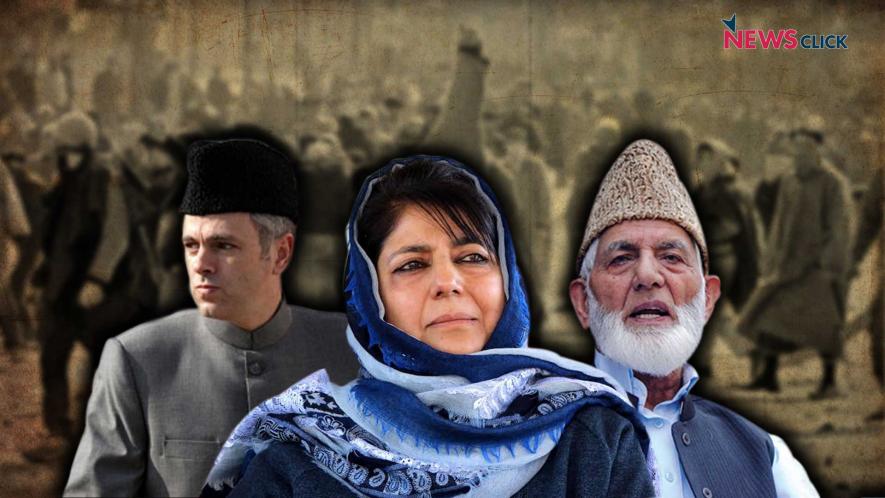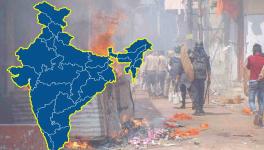Is Article 35A Row Being Used as a Decoy in J&K

Newsclick Image by Nitesh Kumar
Raking up issues threatening the state’s special status has only amplified fears of a worsening situation in Jammu and Kashmir. Amid this, the previous political arrangements are facing a strain due to a rigid government at the centre.
The tensions between the central government and the state are renewed with the pro-India parties like Peoples Democratic Party (PDP), currently ruling the state in coalition with the Bharatiya Janata Party (BJP), uniting with arch-rivals National Conference (NC) on the issue. The relationship of mainstream parties, with BJP at the centre, appears withering with each development on the issue jeopardizing the state’s special status.
The PDP, NC and other independent legislators, comprising the mainstream parties, have warned of a massive outpouring in the valley if Article 35A is tinkered with. The parties have united and even convened a special Assembly session on Monday to discuss the row.
“All parties are on board and there is no difference of opinion on how to approach it,” PDP leader Naeem Akhtar later told media.
The gravity of the issue, perceived by all the parties, united them to oppose, what they termed as an ‘existential threat’. What remains under threat is the very existence of the pro-India politics in Kashmir.
Separatists and the mainstream parties
Even as the BJP and right-wing politics in the country mostly highlight the buying of property and settlement in Kashmir as the main issue, the status of Jammu and Kashmir has become far more complicated under successive governments since 1947. The issue of special status is central to the politics of both the separatist parties and the mainstream parties in Kashmir.
Not just the separatist politicians, a majority of mainstream political parties view Kashmir as a long-standing political issue awaiting a final resolution. While the separatists demand an independent state or a merger with Pakistan, the mainstream political parties, including the PDP and NC, believe that the solution lies within the ambit of the Constitution of India. The special status forms the base of this politics.
With the debate raging over the possible abrogation of Article 35A and subsequently Article 370, the mainstream parties are finding it most difficult to remain relevant among the Kashmiri population and within its own ranks. Chief Minister Mehbooba Mufti who leads the BJP-PDP coalition in the state made a remarkable assessment when she said, “if Article 35A is tampered with then nobody in the state will hold the Indian Tricolour.”
For separatists, the special status remains under a perennial threat as long as the state exists with the Union of India. They view the whole debate on the issue as a ploy to alter the demography of the state and change its Muslim majority character. The premise of their politics revolves around the special status as they see the socio-cultural and political identity of Kashmiris being continuously challenged by the Indian state, therefore, finding the only resolution beyond the ambit of Constitution of India in holding a plebiscite under international auspices.
In its latest press statement on Monday, Mirwaiz Umar Farooq-led Hurriyat Conference said the state will not “tolerate any attempt to damage or harm the special status, aiming at changing the demography of the state and that any such move will further worsen the situation.”
Even as the mainstream parties believe the right to oppose the proposed move rests with them and not the separatists, both of them share almost same apprehensions over the issue.
At this point, it has become clear that the separatist politicians have not been raising a false-alarm all along. When Article 35A was in place, they have rallied over attempts to alter the state’s demography. People reacted in unison in the past, whether in 2008 over the transfer of land to Sri Amarnath Shrine Board or earlier last year, over establishing of Sainik Colonies in the state.
The right-wing groups like RSS, the ideological base of BJP, have all along demanded the abrogation of J&K’s special status. In its vision and mission document, RSS says, “The State of Jammu & Kashmir, with its oppressive Muslim-majority character, has been a headache for our country ever since Independence.”
Debating 35A
Article 35A of the Constitution of India was extended to the state of J&K through a presidential order in 1954 which provided special rights and privileges to permanent residents of the state. At the time of independence, the erstwhile princely state of Jammu and Kashmir had the option to either join India or Pakistan. With special arrangements, the state accessed the Indian union, one among them being retention of the state-subject law. The state was also granted special autonomous status under Article 370 of the Constitution of India.
Constitutional expert Zafar Shah argues if the court rules that the Presidential order on 35A is termed invalid, then such a judgment will have to be made applicable to all the Constitutional Application Orders from 1950 till date. This, however, he adds will snap the constitutional linkage and the position of the state will return to the same it was before such constitutional arrangements were chalked out.
The autonomy of the state under successive governments has faced massive erosion and its remnants in the form of rights and privileges on permanent residence now face a similar attack, putting question marks over the very idea of the state’s accession.
Even today, many believe the state’s accession to the Union of India was made feasible only with the grant of special status. Thus, the issue boils down to the debate over the question of accession itself.
The larger question
Even as there is not a civil unrest like the ones witnessed in 2008, 2009, 2010 or 2016, the situation in the Valley has turned far tenser in 2017. The state of Jammu and Kashmir is currently witnessing one of the most turbulent times in the last decade.
Even as the intensity and number of incidents of violence in the state currently do not match with what it witnessed in the early 1990s. But, there are fears that the violence has escalated especially in South Kashmir. More than 100 youth have joined militant ranks since the killing of a militant commander of Hizbul Mujahideen Burhan Wani in July last year. For the first time since 2008, the civil unrest was a reaction against the killing of a militant rather than against an alleged action to alter the state’s demography or an alleged human rights violation.
The state is caught in the row over the special status when it is finding it difficult to handle the increasing dissent among the Kashmiri population with their renewed support to the militants. Contrary to Ms Mufti’s statement on flying the in Kashmir, there aren’t left many already and the Azadi-sentiment has only intensified with each civilian and militant killing post-Burhan Wani’s killing. With the addition of thousands of injured persons especially those blinded due to pellet-guns in the people’s living memory has made it even more difficult for the state to control these sentiments.
A debate over the special status may work perfectly as a decoy to bring down the bar of demands and subsequent negotiations. Whether 35 A remains or goes, the special status appears will always remain under a threat and so will the bigger political question linger on. The instability will continue unless a proper remedy to core issue is worked out.
Disclaimer: The views expressed here are the author's personal views, and do not necessarily represent the views of Newsclick.
Get the latest reports & analysis with people's perspective on Protests, movements & deep analytical videos, discussions of the current affairs in your Telegram app. Subscribe to NewsClick's Telegram channel & get Real-Time updates on stories, as they get published on our website.
























